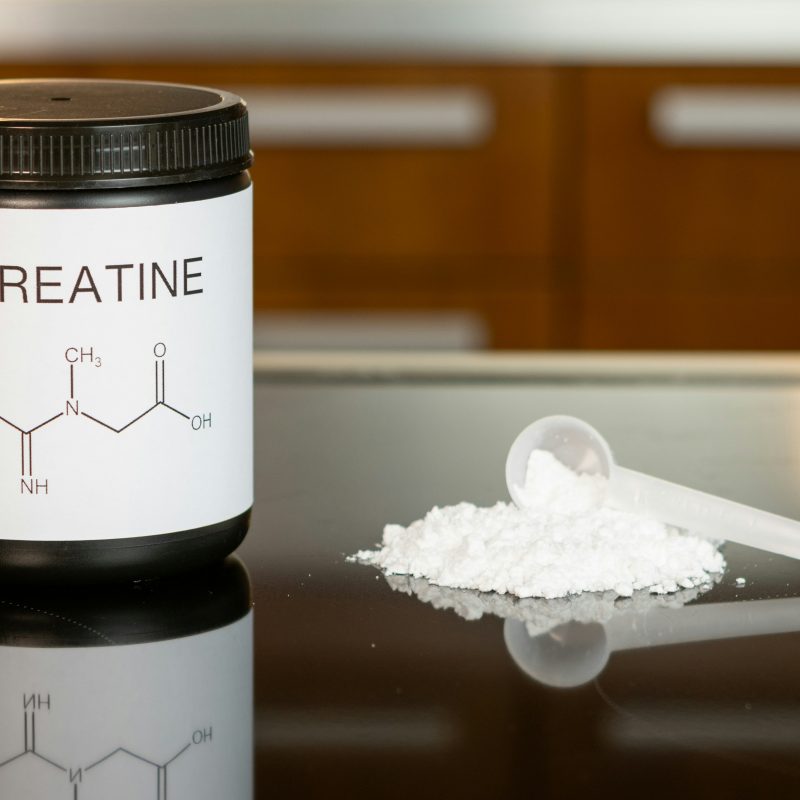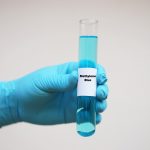
Creatine and creatinine, similar-sounding terms that frequently appear in discussions about sports nutrition, muscle function, and medical diagnostics, actually represent two distinct compounds that play vastly different roles in the human body. Questions and misconceptions often swirl around these two entities, particularly in regard to how they influence one another. Efficacy and long-term safety also cause concern for many bodybuilders. In this article, we will clarify these terms, delve into the science behind their individual mechanisms of action, and also address the potential risk of damaging kidney function.
Understanding Creatine as a Naturally Occurring Compound
Found primarily in muscle tissue, creatine is classified as a nitrogenous organic acid. It holds a key to the complex process of energy production within muscles. Creatine serves as a quick source of energy during activities of high-intensity and short-duration, such as sprinting or bodybuilding. This burst of usable energy gets created via the phosphocreatine system, where creatine phosphate donates a phosphate group to ADP, regenerating ATP, which, as we know, functions as the primary “energy currency” of every cell in the human body.
Supplemental Creatine May Confer Benefits
Creatine, along with protein, tops the list of supplements favored by many serious athletes and weightlifters. When taken in prudent amounts supplementally, creatine benefits may include the following, the details of which we shall delineate later on in the article ~
- Enhance muscle strength/power during high-intensity activities
- Increase lean muscle mass/hypertrophy
- Improve exercise performance
- Accelerate post-exercise recovery, lessening delayed-onset muscle soreness and fatigue
- Enhance brain function/cognitive performance, particularly in tasks requiring short-term memory and decision-making
- Provide potential protective effects against neurological diseases (only further research can definitively confirm these benefits)
- Improve hydration status; creatine can increase water retention in muscle cells, which may benefit overall athletic performance/exercise endurance
One can purchase creatine supplements in one of two forms: creatine monohydrate and creatine ethyl ester. Claims by users and scientists suggest that creatine ethyl ester boasts a more favorable solubility in lipids, enabling higher rates of absorption than creatine monohydrate. However, under normal physiological conditions, creatine ethyl ester lacks stability as it gets converted into creatinine while in the gastrointestinal tract.
Given the average meal plan for adults, in which one ingests prudent amounts of lean protein, normal dietary intake of creatine typically comes out to ~ 1 g/day. However, levels can reach 25–30 g when an athlete consumes a diet high in protein combined with additional supplementation.
The Medical Role of Creatinine
Creatinine, a metabolic byproduct resulting from the breakdown of creatine phosphate in the muscles, originates through a non-enzymatic reaction, which then releases the substance into the bloodstream.
Once circulating in the bloodstream, the kidneys filter out the creatinine and excrete it in urine. This process makes creatinine a valuable marker for assessing kidney function. Physicians count on serum creatinine levels to estimate kidney function as well as to screen for conditions such as chronic kidney disease (CKD) and acute kidney injury (AKI). By measuring the rate at which creatinine clears the bloodstream (creatinine clearance), doctors can evaluate the glomerular filtration rate (GFR), which serves as an essential indicator of kidney health.
As a waste product, then, creatinine does not serve any direct physiological function, as opposed to creatine, which may improve muscle mass and athletic performance.
Delving Into the Accolades of Supplemental Creatine
As we touched upon earlier, athletes turn to supplemental creatine due to its purported health and athletic benefits. Here we present a more thorough explanation of how creatine may serve useful purposes within the body:
- Lean muscle mass: Creatine does more than provide a competitive edge to those who frequent the gym. Outside the realm of elite athletes, creatine supplementation figured prominently in studies on older individuals who have developed sarcopenia, or the loss of muscle mass and strength commonly associated with the aging process. In these individuals, it appears as though creatine may help maintain lean muscle mass, especially when supplementation occurs in conjunction with regular resistance exercise.
- Brain function: The human brain utilizes approximately 20% of the body’s total daily energy needs, whether in the act of powering our thinking, supporting the creation of memories, or directing the multitude of physiological processes that occur consciously and subconsciously. A steady influx of supplemental creatine seems to support healthy oxygen levels within the brain and thereby decrease mental fatigue. The brain actually holds ~ 5% of the body’s total creatine stores to support these complex neurological processes.
- Sleep: Due to the role of creatine in cellular energy production, supplementing with creatine may help provide energy to cells throughout the body when an individual finds themselves in a sleep-deprived condition or cycle. It may manifest itself as one feeling less physically drained, or sensing a boost in cognitive performance even after inadequate hours of rest.
- Mood: Since discovering its alliance with stores of energy in the brain, some recent research studies have focused on a potential link between creatine and mental health. One study conducted on subjects who reported feeling “low” (sad, depressed, unmotivated) revealed that creatine supplementation fostered mood improvements after only a two-week protocol, with feelings of overall anxiety improving after eight weeks. While scientists need more research in this area, mental health and mood might potentially benefit from various creatine supplementation options.
- Hydration: The post-workout “pump” for which bodybuilders strive might not only reflect increased muscle mass but also increased levels of intracellular water. Creatine pulls water into the bodies of the muscles, holding onto it and supporting cellular hydration. The influx of water also promotes whole-body hydration and assists in the regulation of core body temperature. Some athletes report feeling bloated while cycling on supplemental creatine, which tends to dissipate as they cycle off the product.
- Women’s health: Female reproductive hormones — estrogen, progesterone — tend to alter creatine production and storage, particularly in the parts of the brain that control mood, cognition, and memory. Compared to their male counterparts, women only store about 70-80% as much creatine in their bodies, so supplemental creatine may serve as a powerful tool for women of all ages, especially during the life stages of perimenopause and menopause, when female hormones shift greatly.
- Healthy bones: Throughout menopause, as estrogen levels naturally decline, women typically experience age-related bone loss and increased oxidative stress. Supplementing with creatine seems potentially able to support these processes by helping to maintain a more normal balance of inflammatory and blood markers of bone breakdown. Additionally, because of the connection between muscle integrity and bone density, enhancing muscle mass and strength through resistance exercises can further support bone health, especially with the help of supplemental creatine.
Serum Creatinine Levels and Kidney Health
Since creatinine comes about as a byproduct of creatine metabolism, supplementing with creatine can lead to an increase in serum creatinine. This increase typically remains within a modest and acceptable level medically, and does not automatically indicate kidney damage. However, it can complicate the interpretation of kidney function tests, leading to false alarms in medical diagnostics.
Although the assessment of serum creatinine levels constitutes a standard part of a complete metabolic panel (CMP), the tests most physicians routinely order at yearly physicals, taking into account only creatinine level, may not serve as the optimal way to understand/diagnose overall kidney health. A “normal” creatinine level in the blood can fluctuate depending upon one’s age, sex, body size, muscle mass, dietary protein intake, and other factors. Some people — including very muscular individuals, those whose regular diets include a large amount of protein, and those who take creatine supplements — may show high serum creatinine levels that do not align with poor kidney function and therefore do not require treatment.
Creatine gets spontaneously and irreversibly degraded to creatinine at a rate of approximately 2% of the total body pool every day. If an individual engages in chronic creatine supplement intake, thereby enhancing total body creatine content, a physiological rise in serum creatinine does not automatically indicate any potential harm to the kidneys. Interestingly, the inverse can also hold. Individuals who practice a vegan or vegetarian lifestyle may reveal lower levels of serum creatine and creatinine clearance, owing to low animal protein intake.
We can think of creatine intake as a cofactor of serum creatinine levels. For this reason, calculating creatinine clearance solely from equations that only take into consideration serum creatinine levels, without accounting for its concentration in urine, could prove both inadequate and inaccurate in individuals who partake of creatine supplements. Ignoring this bias can lead to misinterpretation of test results, leading to an incorrect diagnosis, a frightening false positive for kidney disease.
Based on studies assessing kidney function using reliable methods, creatine supplements overall seem safe for human consumption. Further studies on individuals and athletes who have pre-existing kidney disease remain necessary to fully elucidate this issue.
Final Thoughts
Despite some anecdotal reports and experimental data suggesting that creatine could cause deleterious/irreversible damage to the kidneys, cumulative evidence from independent, controlled trials clearly shows no overt reason for caution. Some research experts did discover gaps in the literature, particularly scant testing on the use of creatine supplementation in patients known to have kidney disease or very low overall kidney function. For those at risk of decreased glomerular filtration rate – often seen in older adults or those with certain comorbid clinical conditions — monitoring kidney function while supplementing with creatine appears to make good sense, although large, long-term studies have shown no risks. Finally, consumers should select creatine supplements that have been properly tested and certified for their quality/purity, avoiding the health risks associated with contaminants.
Creatinine test results can prove difficult to interpret. If a blood test shows an elevated creatinine level, follow up with a medical professional. Above all, patients should always inform their physician of any supplements they take on a routine basis, including creatine, when creatinine levels are assessed.
References
https://becomelucid.com/blogs/news/creatine-vs-creatinine?tw_source=google&tw_adid=&tw_campaign=19436873423&tw_kwdid=&tw_source=google&tw_adid=&tw_campaign=19436873423&tw_kwdid=&gad_source=1&gad_campaignid=19436598208&gbraid=0AAAAAo3mUFPDt5LOz9-cMxEVlklmMMCrt&gclid=CjwKCAiAzrbIBhA3EiwAUBaUdYTsNX5iObytLhK1T7rE0290FtXAU96MpQc7kkhgHFb8Nb0y56w44RoC8sQQAvD_BwE
https://www.thorne.com/take-5-daily/article/7-surprising-facts-about-creatine?gad_source=1&gad_campaignid=19296269238&gbraid=0AAAAADLUbJX7XiHjVnIyDLhWlhYK8-Axn&gclid=CjwKCAiAzrbIBhA3EiwAUBaUdVqd5BnQuqK51mJhbUmC5-k2LLC2Q4_lgl4T-hY23WbcVukLNIRHERoCR9oQAvD_BwE
https://pmc.ncbi.nlm.nih.gov/articles/PMC4170516/#:~:text=It%20was%20found%20that%20serum,marginal%20increase%20in%20serum%20creatinine.
https://pmc.ncbi.nlm.nih.gov/articles/PMC10054094/
https://www.kidney.org/kidney-topics/creatinine#:~:text=Some%20factors%20that%20can%20lead,Recent%20high%20intensity%20exercise
https://bmcnephrol.biomedcentral.com/articles/10.1186/s12882-025-04558-6
https://www.ajkd.org/article/S0272-6386(09)01459-0/abstract
https://www.bmj.com/rapid-response/2011/11/02/true-kidney-disease-patient-using-protein-and-creatine-supplements
https://www.mdedge.com/familymedicine/article/64604/nephrology/exercise-induced-proteinuria/page/0/1
https://pmc.ncbi.nlm.nih.gov/articles/PMC4421632/
https://www.everydayhealth.com/kidney-diseases/high-creatinine-levels-causes-symptoms-treatments/#:~:text=Some%20people%20—%20including%20very%20muscular,and%20do%20not%20require%20treatment
https://www.tandfonline.com/doi/full/10.1080/0886022X.2024.2364762






